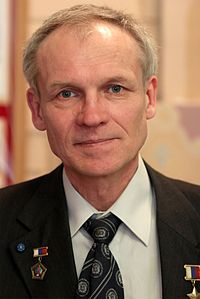Sergey Avdeev
Sergei Avdeyev | |
|---|---|
 | |
| Born | 1 January 1956 |
| Nationality | Russian |
| Occupation | Engineer |
| Awards | |
| Space career | |
| Cosmonaut | |
Time in space | 747d 14h 14m |
| Selection | 1987 |
| Missions | Soyuz TM-15, Soyuz TM-22, Soyuz TM-28 |
Sergei Avdeyev (Сергей Васильевич Авдеев, born 1 January 1956) is a Russian engineer and cosmonaut.
Avdeyev was born in Chapayevsk, Samara Oblast (formerly Kuybyshev Oblast), Russian SFSR. He graduated from Moscow Physics-Engineering Institute in 1979 as an engineer-physicist. From 1979 to 1987 he worked as an engineer for NPO Energiya. He was selected as a cosmonaut as part of the Energia Engineer Group 9 on 26 March 1987. His basic cosmonaut training was from December 1987 through to July 1989. He retired as a cosmonaut on 14 February 2003.
Avdeyev at one point held the record for cumulative time spent in space with 747.59 days in earth orbit, accumulated through three tours of duty aboard the Mir Space Station. He has orbited the earth 11,968 times traveling about 515,000,000 kilometers. In August 2005, this record was taken by another cosmonaut, Sergei K. Krikalev.
Avdeyev is married with two children. He is an amateur radio operator, and his call sign is RV3DW.
Time dilation record
For a long time, Avdeyev held the record for time dilation experienced by a human being.[1][2][3] In his 747 days aboard Mir, cumulative across three missions, he went approximately 27,360 km/h and thus aged roughly 0.02 seconds (20 milliseconds) less than an Earthbound person would have,[4] which is considerably more than any other human being, except Sergei Krikalev.[5] This is due to the special relativistic effect of time dilation and is not properly thought of as time travelling as described by mainstream culture. A common misconception is that the Apollo astronauts hold the record—they did go faster than Avdeyev, but they were only in space for a few days.
Spaceflights
- Soyuz TM-15 – 27 July 1992 to 1 February 1993 – 188 days, 21 hours, 41 minutes, 15 seconds
- Soyuz TM-22 – 3 September 1995 to 29 February 1996 – 179 days, 1 hour, 41 minutes, 45 seconds
- Soyuz TM-28 & Soyuz TM-29 – 13 August 1998 to 28 August 1999 – 379 days, 14 hours, 51 minutes, 9 seconds
Spacewalks (42 hours, 2 minutes)
- 1. MIR EO-12 – 3 September 1992 – 3 hours, 56 minutes
- 2. MIR EO-12 – 7 September 1992 – 5 hours, 8 minutes
- 3. MIR EO-12 – 11 September 1992 – 5 hours, 44 minutes
- 4. MIR EO-12 – 15 September 1992 – 3 hours, 33 minutes
- 5. MIR EO-20 – 20 October 1995 – 5 hours, 11 minutes
- 6. MIR EO-20 – 8 December 1995 – 0 hours, 37 minutes
- 7. MIR EO-26 – 15 September 1998 – 0 hours, 30 minutes
- 8. MIR EO-26 – 17 November 1998 – 5 hours, 54 minutes
- 9. MIR EO-27 – 23 July 1999 – 6 hours, 7 minutes
- 10. MIR EO-27 – 28 July 1999 – 5 hours, 22 minutes
Honours and awards
- Hero of the Russian Federation (February 5, 1993) - for the successful implementation of spaceflight on the orbital scientific research complex Mir and displaying courage and heroism
- Order of Merit for the Fatherland;
- 2nd class (22 November 1999) - for courage and heroism displayed during prolonged space flight on the orbital scientific research complex Mir
- 3rd class (April 1, 1996) - for the successful implementation of spaceflight on the orbital scientific research complex Mir and displaying courage and heroism
- Medal "For Merit in Space Exploration" (April 12, 2011) - for the great achievements in the field of research, development and use of outer space, many years of diligent work, public activities
- Chevalier of the Legion of Honour (France, March 1999)
- Pilot-Cosmonaut of the Russian Federation (February 5, 1993)
- Honorary Citizen of Chapayevsk, Samara Oblast (2004)
References
- ^ "Exploring the Universe". American Museum of Natural History. Retrieved 8 July 2011.
Avdeyev is 00.2 seconds younger than he would have been had he never traveled in space.
- ^ rstevens (14 November 2001). "Time travel: Truth not always stranger than science fiction". Princeton University. Retrieved 8 July 2011.
'The greatest time traveler so far is (cosmonaut) Sergei Avdeyev, who, by virtue of being on space flights for 748 days, is one-fiftieth of a second younger than if he had stayed home. So that man has traveled one-fiftieth of a second into the future.'
- ^ Mowbray, Scott (19 February 2002). "Let's Do the Time Warp Again". Popular Science. Retrieved 8 July 2011.
Spending just over two years in Mir's Earth orbit, going 17,500 miles per hour, put Sergei Avdeyev 1/50th of a second into the future…'he's the greatest time traveler we have so far.'
- ^ Gott, J. Richard (2002). "Time Travel in Einstein's Universe".
{{cite journal}}: Cite journal requires|journal=(help) p. 75 - ^ Overbye, Dennis (28 June 2005). "A Trip Forward in Time. Your Travel Agent: Einstein". The New York Times. Retrieved 8 December 2015.
See also
- Heroes of the Russian Federation
- 1956 births
- Living people
- People from Chapayevsk
- Russian cosmonauts
- European amateur radio operators
- Recipients of the Order "For Merit to the Fatherland", 2nd class
- Recipients of the Order "For Merit to the Fatherland", 3rd class
- Chevaliers of the Légion d'honneur
- Pilot-Cosmonauts of the Russian Federation
- Recipients of the Medal "For Merit in Space Exploration"
- Employees of RSC Energia
